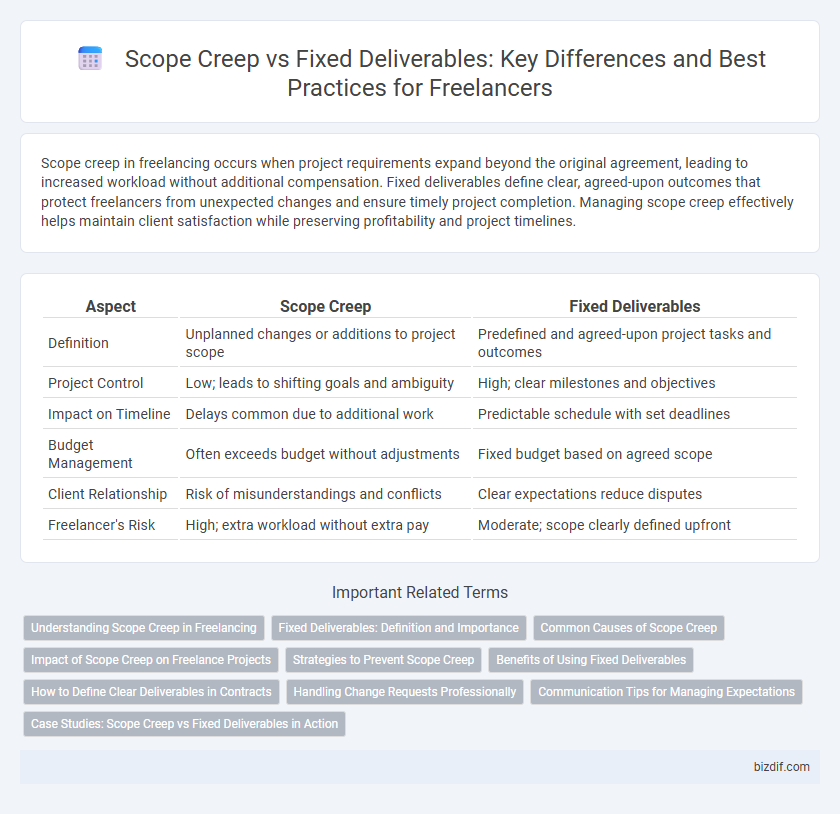Scope creep in freelancing occurs when project requirements expand beyond the original agreement, leading to increased workload without additional compensation. Fixed deliverables define clear, agreed-upon outcomes that protect freelancers from unexpected changes and ensure timely project completion. Managing scope creep effectively helps maintain client satisfaction while preserving profitability and project timelines.
Table of Comparison
| Aspect | Scope Creep | Fixed Deliverables |
|---|---|---|
| Definition | Unplanned changes or additions to project scope | Predefined and agreed-upon project tasks and outcomes |
| Project Control | Low; leads to shifting goals and ambiguity | High; clear milestones and objectives |
| Impact on Timeline | Delays common due to additional work | Predictable schedule with set deadlines |
| Budget Management | Often exceeds budget without adjustments | Fixed budget based on agreed scope |
| Client Relationship | Risk of misunderstandings and conflicts | Clear expectations reduce disputes |
| Freelancer's Risk | High; extra workload without extra pay | Moderate; scope clearly defined upfront |
Understanding Scope Creep in Freelancing
Scope creep in freelancing refers to the gradual expansion of project requirements beyond the original agreement without corresponding adjustments in time, budget, or compensation. It often arises from unclear project specifications, evolving client demands, or informal communication, leading to increased workload and potential delays. Recognizing and managing scope creep through detailed contracts and regular client consultations is essential to maintaining project boundaries and ensuring fair compensation.
Fixed Deliverables: Definition and Importance
Fixed deliverables in freelancing refer to clearly defined project outcomes agreed upon before work begins, ensuring scope and expectations remain constant. This approach eliminates ambiguity by specifying exact tasks, deadlines, and quality standards, preventing scope creep from derailing timelines and budgets. Defining fixed deliverables enhances client trust, enables accurate pricing, and improves project management efficiency.
Common Causes of Scope Creep
Scope creep in freelancing often arises from unclear project requirements, evolving client expectations, and lack of detailed contracts specifying fixed deliverables. Frequent changes without formal agreement can lead to extended deadlines and increased workload beyond the original scope. Clear communication, comprehensive project briefs, and well-defined deliverables help mitigate the risk of scope creep.
Impact of Scope Creep on Freelance Projects
Scope creep in freelance projects significantly disrupts timelines and inflates budgets, often leading to client dissatisfaction and reduced profitability for freelancers. Uncontrolled changes and additions to project requirements increase workload without corresponding compensation, causing stress and potential burnout. Effective management of scope boundaries ensures clear deliverables, maintaining trust and financial stability in freelancing engagements.
Strategies to Prevent Scope Creep
Clearly defining project requirements and deliverables in a detailed contract minimizes the risk of scope creep by setting client expectations upfront. Implementing change request processes ensures any modifications are documented, reviewed, and agreed upon before work proceeds, maintaining project boundaries. Regular communication and progress updates keep clients informed, reducing misunderstandings that lead to unplanned expansions beyond fixed deliverables.
Benefits of Using Fixed Deliverables
Fixed deliverables provide clear project boundaries, ensuring freelancers and clients maintain aligned expectations and prevent scope creep. This approach enhances budget accuracy and time management by defining specific tasks and outcomes upfront. Clients benefit from transparent, measurable results, while freelancers experience reduced ambiguity and improved workflow efficiency.
How to Define Clear Deliverables in Contracts
Defining clear deliverables in contracts requires specifying exact tasks, deadlines, and expected outcomes to prevent scope creep in freelancing projects. Including detailed descriptions and measurable criteria ensures both parties understand the project boundaries and responsibilities. Utilizing milestone-based payments linked to these deliverables enhances accountability and project transparency.
Handling Change Requests Professionally
Handling change requests professionally in freelancing involves clearly defining project scope and deliverables upfront to prevent scope creep. Implementing a structured change management process with documented approvals and revised timelines ensures transparency and client satisfaction. Communicating the impact of changes on cost and schedule helps maintain trust and project control.
Communication Tips for Managing Expectations
Clear, consistent communication is essential to prevent scope creep in freelancing projects by defining fixed deliverables upfront and setting boundaries for additional requests. Using detailed project briefs and regular updates helps align client expectations with agreed-upon outcomes. Establishing a formal change request process promotes transparency and reinforces accountability throughout the project lifecycle.
Case Studies: Scope Creep vs Fixed Deliverables in Action
Case studies comparing scope creep and fixed deliverables in freelancing reveal that projects with clearly defined deliverables consistently meet deadlines and budgets, while scope creep leads to extended timelines and increased costs. Data from multiple freelancing platforms show that clients who agree on fixed deliverables experience 30% higher project satisfaction rates and 25% fewer revisions. These insights highlight the importance of setting precise project boundaries to manage expectations and ensure successful outcomes.
Scope Creep vs Fixed Deliverables Infographic

 bizdif.com
bizdif.com